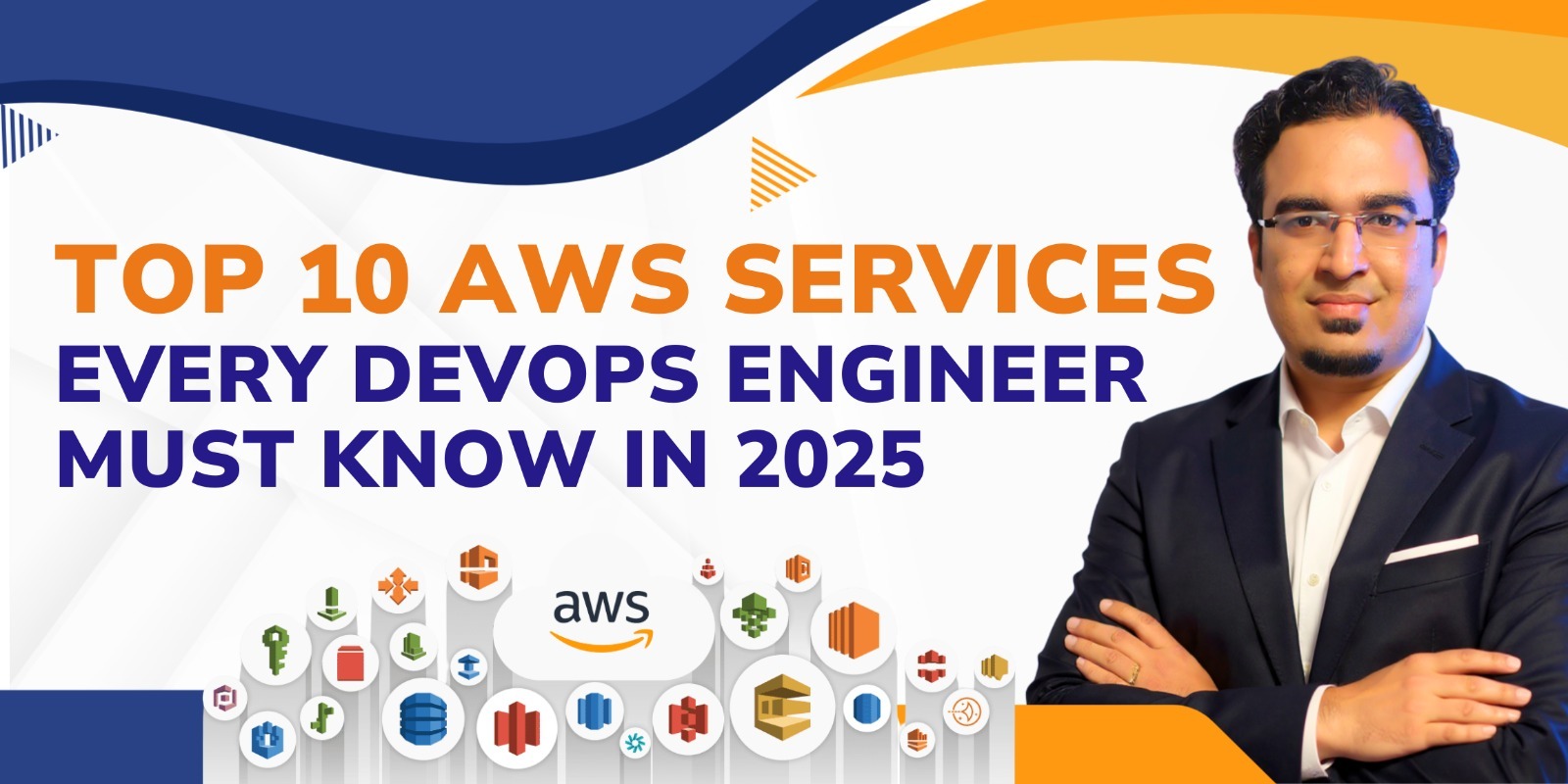There are no items in your cart
Add More
Add More
| Item Details | Price | ||
|---|---|---|---|



Introduction
Amazon Web Services (AWS) is one of the most widely used cloud platforms in the world. It offers a huge variety of tools and services that help businesses build, deploy, and scale applications easily. If you are just starting your DevOps journey, it is important to get familiar with the most commonly used AWS services.
What is AWS ?
AWS, or Amazon Web Services, is a cloud platform that provides on-demand IT services over the internet, including computing power, storage, databases, and more. Instead of managing physical servers and data centers, users can "rent" these services from Amazon, paying only for what they use.
AWS offers a vast collection of over 200 services, forming a highly reliable, scalable, and secure global infrastructure used by businesses of all sizes to build, deploy, and manage their applications and workloads.
The 10 AWS Services DevOps Engineers must know in 2025
1. Amazon EC2 (Elastic Compute Cloud):
EC2 stands for Amazon Elastic Compute Cloud. It is a web service provided by Amazon Web Services (AWS) that offers resizable compute capacity in the cloud. EC2 allows you to rent virtual servers, known as instances, to run your applications. With EC2, you can quickly scale your computing resources up or down based on your needs, paying only for the capacity you use.
2.Amazon S3 (Simple Storage Service):
Amazon Simple Storage Service (S3) is an object storage service by Amazon Web Services (AWS) that provides scalable, secure, and durable storage for any amount of data from anywhere on the web. Data is stored as "objects" in "buckets," which are containers for these objects, and users pay only for the storage they use with no setup costs.
3.Amazon RDS (Relational Database Service):
Amazon Relational Database Service (RDS) is a managed service that simplifies the setup, operation, and scaling of relational databases in the cloud. As a managed service (Platform as a Service), RDS automates common administrative tasks like provisioning, patching, backups, and recovery, freeing up your team to focus on application development.
4.Amazon VPC (virtual private cloud):
Amazon VPC (Virtual Private Cloud) provides a logically isolated, private network within the AWS cloud where you can launch AWS resources like EC2 instances. You have complete control over your virtual network environment, including defining your IP address ranges (CIDR blocks), creating subnets, and configuring routing and network gateways to control traffic flow.
5.AWS IAM (Identity and Access Management):
AWS Identity and Access Management (IAM) is an AWS service that allows you to control who can access your AWS resources and what actions they can perform. It manages users, their security credentials, and permissions by associating policies with users, groups, or roles.
6.Amazon EKS (Elastic Kubernetes Service):
Amazon Elastic Kubernetes Service (EKS) is a fully managed service that simplifies the process of running Kubernetes on AWS. With EKS you can easily deploy manage and scale containerized applications using Kubernetes without the need to install and operate your own control plane or nodes
7.Amazon EBS (Elastic Block Store):
Amazon EBS (Elastic Block Store) provides scalable, high-performance, and persistent block-level storage volumes for Amazon EC2 instances in the AWS cloud, functioning like virtual hard drives.
8.AWS Cloudwatch :
Amazon CloudWatch is a monitoring and observability service from Amazon Web Services (AWS) that collects, monitors, and stores metrics, logs, and events from your applications and AWS resources. It provides a system-wide view of operational health, resource utilization, and application performance.
9.AWS Lambda:
AWS Lambda is a serverless computing service provided by Amazon Web Services (AWS) that enables users to run code without provisioning or managing servers. It operates on an event-driven model, meaning code execution is triggered in response to various events.
10.AWS CodeBuild:
AWS CodeBuild is a fully managed continuous integration service in the cloud provided by Amazon Web Services. It is designed to automate the process of compiling source code, running tests, and producing deployable software packages.
Conclusion
Mastering these 10 AWS services will empower DevOps engineers to build, deploy, and manage cloud infrastructure efficiently. Whether you're working on CI/CD pipelines, security, monitoring, or cost optimization, these tools are essential for modern DevOps practices.
Fri Sep 19, 2025
"DevOps is the union of people, processes, and products to enable continuous delivery of value to our end users." - Donovan Brown
Ayushman Sen is a DevOps Engineer at CloudDevOpsHub with a passion for cloud technologies and automation. He enjoys writing blogs to share his DevOps knowledge and insights with the community. A true DevOps enthusiast, Ayushman is also passionate about traveling, listening to music, and playing musical instruments.

Ayushman Sen
DevOps Engineer at CloudDevOpsHub